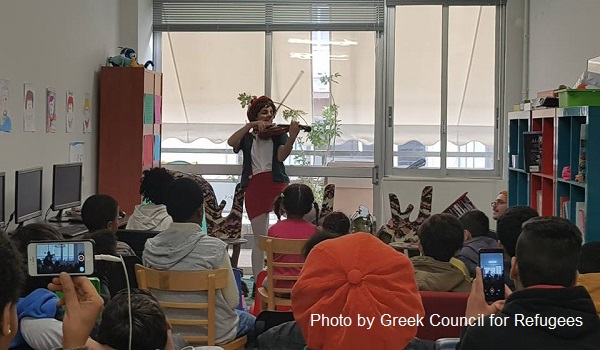By Ira Iliana Papadopoulou, sociologist and communications specialist currently serving as Communications & Events Manager at Greek Council for Refugees (GCR).
A brief review of the last thirty years of Greek history will demonstrate that the country is no stranger to the arrival of asylum seekers and migrants. However, despite the long experience little has been done for the socio-economic inclusion into Greek society for people granted protection.
Two attempts (2013, 2019) for national strategies for the integration of third-country nationals – mainly related to issues of language education, access to health care and to labour market – never achieved full implementation and remained a largely unfulfilled and relatively vague vision.
Today, while the country still faces major economic challenges and far-right aggression, the expanded population of recognised refugees is struggling to survive in a country offering a limited and highly bureaucratic social welfare system and limited access to housing, to the labour market, to education, and to healthcare.
Much attention has (justifiably so) been given by media and NGOs to the destitution and psychical conditions suffered by people granted refugee status in Greece. With so many urgent needs unmet it may seem somewhat comparatively less relevant to provide people of refugee background with a feeling of community and a sense of belonging. However, when people are forced to flee and leave behind their home, their social networks, and their identity, social inclusion is part of the equation.
Up to a certain extent, the social isolation can be explained by language gaps, employment challenges and absence of any family support system. But, if we are interested as a society in building and maintaining social cohesion, we ought to think of solutions and provide spaces of protection, comfort and respect for our new fellow citizens of refugee background.
As Greek governments have left a significant gap when it comes to integration, local intercultural centres have often proven capable in trying to fill the void, either as independent components of NGOs or as government funded municipal centres. With different methodologies but with a common vision, intercultural centres envisage cultural mixing and inclusion as a purposeful and sustained practice.
Recognised refugees can find a place for learning the language, or getting help with writing a CV, or even get advice and support in raising their children in a new cultural environment. The few intercultural centres, mainly based in big cities, provide a chance for refugees to express their problems in their effort to adapt to the Greek society, and often to find support.
This was exactly the case with Greek Council for Refugees’ Intercultural Centre PYXIDA. The Centre opened in 1996 as a response to the suffering of refugee communities who were isolated and excluded from Greek society. PYXIDA aimed at facilitating the integration of refugees in Greece and assisting in their smooth adaptation to their new environment.
Over the past two decades, the Centre has grown with the help of volunteers and a small team of interdisciplinary staff (teachers, interpreters, social workers, mental health counsellors) who offer a wide range of integration programs and services including: Greek and English language lessons for adults, supportive teaching for primary school children and adolescents, guidance with school enrolments, psychosocial and recreational activities for children and families, employment counselling and skills development for adults as well as liaison with employers.
In essence, PYXIDA’s holistic approach aims at empowering all members of a refugee family, offering a safe place to build relationships and feel a sense of community and belonging. And indeed the stories of those benefiting from PYXIDA’s programs and services are inspiring. Annually, about 500 children and adults have attended programs, events, or counselling.
Currently, more than 300 adults and minors attend Greek language lessons, families receive support in enrolling their children in schools, and children receive help with their homework and enjoy educational day activities while their parents attend classes. Moreover, families can join “parents’ groups” to meet and discuss about everyday life in Greece and those who are looking for job can benefit from the range of services offered at GCR’s employment office.
But as all independent intercultural centres operating without any governmental funding and with limited resources relying on donations, PYXIDA’s economic sustainability is shaky. PYXIDA is addressing the public with a crowdfunding campaign explaining the everyday work and the stories of our beneficiaries participating in this amazing hub of bonding opportunities.
Integration is a complex puzzle to solve, but for those who care, the example of intercultural centres’ programs for refugees and migrants might be a first step towards a big-picture answer. Let us all hope that this answer will keep giving priority to people in need for a sense of belonging.
Op-ed: ECRE publishes op-eds by commentators with relevant experience and expertise in the field who want to contribute to the debate on refugee rights in Europe. The views expressed are those of the author and does not necessarily reflect ECRE positions.
Photo: Greek Council for Refugees
This article appeared in the ECRE Weekly Bulletin. You can subscribe to the Weekly Bulletin here.

